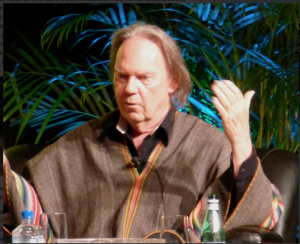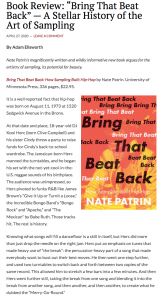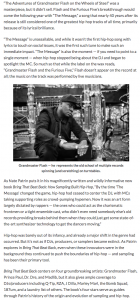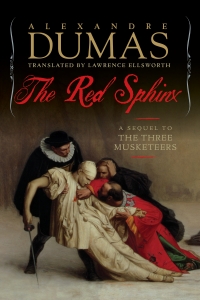 Readers of this blog may recall that in years past I’ve written about Lawrence Ellsworth, a client of my literary agency, who is translating all six* novels in Alexandre Dumas’s classic Musketeers Cycle. Three volumes have already published by Pegasus Books—The Red Sphinx, The Three Musketeers, and Twenty Years After—with a fourth volume, Blood Royal, due out later this year.
Readers of this blog may recall that in years past I’ve written about Lawrence Ellsworth, a client of my literary agency, who is translating all six* novels in Alexandre Dumas’s classic Musketeers Cycle. Three volumes have already published by Pegasus Books—The Red Sphinx, The Three Musketeers, and Twenty Years After—with a fourth volume, Blood Royal, due out later this year.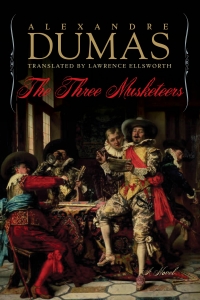
Amazing as Ellsworth’s enterprise is, I should point out that it is actually a pen name, and that under his real name, Lawrence Schick, he has an equally impressive résumé. Both of his names are featured in a superb profile and interview that journalist and novelist Andrew Ervin has recently published in the Brooklyn Rail. The profile portion begins like this:
As far as I can tell, Lawrence Ellsworth is responsible for one of the biggest literary projects happening right now in the English language. Like William T. Vollmann’s “Seven Dreams” series of novels about the European occupation of the New World and Rachel Blau DuPlessis’s Drafts, an interlocking and cross-referencing “poem of a life,” Ellsworth is working on a massive and daunting scale. He’s translating the entirety of Alexandre Dumas’s stories of The Three Musketeers (1844), all 1.5 million words of it. The third volume, Twenty Years After, appeared late last year.
Twenty Years After restores a chapter that Dumas once serialized in his native French but which has never before appeared in English. It also, as with the previous and future volumes, moves past the Victorian-era translations that were, per Ellsworth’s introduction, for an “audience that was uncomfortable with frank depictions of violence and sexuality.” Those old translations, he reminds us, “employed a style of elevated diction that was deemed appropriate for historical novels of the 19th century, but seems stiff, long-winded, and passive to today’s readers.” In Ellsworth’s hands, these stories of swashbuckling and all-for-one-and-one-for-all friendship feel new again. The Three Musketeers is an enormously entertaining tale for the ages.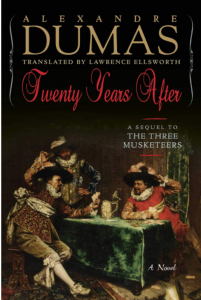
A few paragraphs later, Ervin brings up the Schick side of his persona:
It so happens that Lawrence Ellsworth is the pen name of Lawrence Schick, who was an early employee of TSR, the company that created Dungeons & Dragons [the role-playing game]. There, he wrote White Plume Mountain (1979), which I personally regard as the greatest D&D adventure module of all time. He’s also the co-creator of the earliest version of the D&D setting Mystara, in which my own long-running campaign is set even now. Since then, among other pursuits, Ellsworth served as Loremaster for the Elder Scrolls Online games and now lives in Dublin, where he is hard at work writing a new mobile game.
Ellsworth was generous enough to correspond with me via email in January and February, during which time we discussed world-building, how to write an epic role-playing game (RPG) adventure, and the challenges of adapting Dumas for current audiences. There’s a unique and profound joy in getting to pick the brain of a multi-talented writer whose work I’ve known since I was a kid and who’s had such a huge impact on my own creative life.
When the piece moves in to the interview portion, Ervin asks how Lawrence undertook the mammoth task of translating Dumas:
We were looking for a subject for our next game when I remembered Dumas and his musketeers. It turned out to be a great choice, and in the process of doing the research for [what became] The King’s Musketeers I got hooked on the characters and the period all over again, so much so that I started doing independent study into Early Modern Europe and France in the 17th century. I decided that I wanted to write historical fiction in that setting and began collecting materials.
I was teaching myself French and rereading Dumas, and began to realize that his writing wasn’t creaky and old-fashioned, but his Victorian English translations were. Reading Dumas in the original French was a revelation: dynamic prose, crackling dialogue, vivid scenes, plus he was funny as hell. Most of the English translations of his work paled in comparison.
By this time I was reading beyond Dumas’s famous novels and into his more obscure works, and I kept coming across references to a musketeers-period swashbuckler from late in his career called The Comte de Moret, but there was no extant English translation and it was impossible to find. Finally I came across French reprint copies of its two volumes in the bouquiniste stalls in Paris, and though the novel was unfinished, it was grand stuff, genuine Dumas bursting with all his color, humor, and joie de vivre. I’d done my own translation of The Three Musketeers as part of my learning-French project, and as I was flying back from Paris, it suddenly occurred to me that I could translate Moret and from that idea was born the literary reconstruction that became The Red Sphinx.
Ervin’s last question is a good one:
Rail: Why is it that Dumas’s stories still feel so vital, especially right now?
Ellsworth: Dumas’s work remains vital and relevant over 150 years later because his best novels speak to the problem of courage, of how an individual can find the strength and means to do what’s right despite the constraints of society, family, and convention. This is a problem that never goes away, a matter that every generation has to face for itself. Unlike many of the heroes of historical fiction, Dumas’s characters are complex, three-dimensional humans of depth and contradiction, people for whom wrestling with these problems is no easy matter. Look at Cardinal Richelieu, an antagonist and seeming villain in The Three Musketeers, yet a protagonist in The Red Sphinx. Because his novels are exciting and plot-heavy, and because his early translators cut out the sex, softened the language, and dialed back the violence, in the early 20th century Dumas’s work was miscategorized as “Boys’ Adventures,” a label that has stuck for far too long. His best work is long overdue for a re-assessment, at least in the Anglophone world.
I recommend you read the whole profile and interview which combined are quite a bit longer than the excerpts I’ve provided here. I’m going to check out Andrew Ervin’s work, whose bio states:
Andrew Ervin is the author of the novel Burning Down George Orwell’s House and the novella collection Extraordinary Renditions. His most recent book is Bit by Bit: How Video Games Transformed Our World.
And if you’d like to know how a prominent critic assesses the new Dumas translations by Lawrence Ellsworth, please consider this in a review from the estimable Washington Post book critic Michael Dirda:
“En garde! In Lawrence Ellsworth’s excellent, compulsively readable translation, The Red Sphinx is just the book to see you through the January doldrums. And maybe those of February, too.
If your interest extends to other classic tales of adventure, I suggest you also check out the anthology Ellsworth edited for Pegasus The Big Book of Swashbuckling Adventure, with tales by Rafael Sabatini, Conan Doyle, Baroness Orczy, and others. 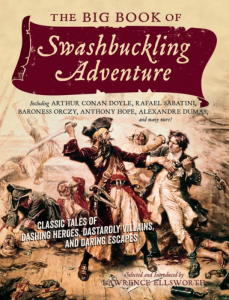
*In the end, there will be eight novels in Ellsworth’s rendering of the Dumas canon in to English, because he is splitting some of the longer French versions in to two volumes.

